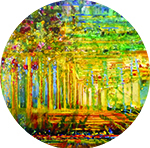The Sap Rises

The difficult choices we make enable us to grow sweeter fruit
O

ur house came with lovely trees, including one near the side door that grew tall and strong. Each year, its inedible berries would fall like a purple-blue carpet on the steps near the kitchen door.
The kids liked the sound they made as they squished under their feet. This would be unremarkable, except for the impossible mess they made as the remnants of the berries made their way into the house… and onto our kitchen floor and the white carpet on the stairs. Not my idea of a good time.
After battling the stains for a couple of years, and becoming the carpet cleaner’s best customer, I was done. The tree had to go. I called the rabbi, got permission to have it cut down , and called the tree man. Having worked in a religious area for a while, the man asked me, “Ma’am, are you sure you’re allowed to cut that tree down?”
“Yes, certainly,” I replied determinedly. “Go ahead.”
When the deed was done, I was relieved at first… but then I grew sad. A thing of beauty was no more. I found myself wondering if I couldn’t have lived with the purple-blue footprints a little longer.
Potential Within
The trees of our lives are statuesque observers, dignified witnesses to the comings and goings of our existence. They grow with us. They have their stories just as we have ours. “But the person is like the tree of the field” (Devarim 20:19).
And there are many lessons we can learn from the trees that surround us, as our Sages taught: (Tikunei Zohar, Introduction) “You created Heaven and earth, trees and grasses and human beings, so that the higher worlds could be known through them… and so the higher worlds could be known through the lower worlds.” What does this mean for us?
After the Jews captured the land of Israel, they were commanded to first involve themselves in planting — just as Hashem involved Himself in planting the Garden of Eden, as it says “Va’yita Hashem Elokim gan b’Eden.” Sheim MiShmuel (Kiddushin 10) notes that a sapling is planted in the earth, which has no taste or aroma — yet from that small shoot will grow a tree that produces sweet and aromatic fruit. So, too, each individual has vast potential hidden within. We must plant within ourselves a connection to Hashem and his Torah, so our attempts to self-actualize bear fruit — middos tovos and love and fear of the Creator.
Rabbi Asher Sinclair explains that the sap rising in the tree is the tree giving birth to its next plane of existence. In the winter of our lives, it seems as if the winter has killed the life that was summer; the snow is like the white hair that crowns our declining years, a daily reminder that our story is closer to the finish than the start. Yet Tu B’Shevat is a glorious day that reminds us we will attain another plane of existence.
A tree’s roots extend deep into the ground, while its branches stretch toward the sky. A person is like an upside-down tree: His roots are in the Shamayim, his soul is nurtured from Above, while his body is grounded. His strength comes from his connection to his Creator, and that allows him to blossom in This World, and the next. (Netzach Yisrael 7:26)
On Tu B’Shevat, we celebrate the ultimate life that will be born from the tree, and we remember that all our struggles shape us and mold us — that the difficult choices we made along the way planted us more deeply and enabled us to grow new branches and sweeter fruit.
Hidden Life
Holding on to the knowledge of the sap rising in a tree that looks lifeless is a worldview. There is always more life present than meets the eye.
Rivka and Shmuel had been struggling in their marriage for years. They used to argue a lot, but eventually they fell into a cold stalemate. They each went about their individual lives, barely engaging with the other—but at least they no longer fought.
One day, Shmuel came home and picked a fight with Rivka. Rivka was startled; it had been a while since she’d seen this level of antagonism. She was about to respond, when something about the tone of her husband’s voice gave her pause. He wants to engage, she realized. He’s tired of the apathy. Maybe he really does want a connection. The sap was rising in the tree.
Avi was always a good kid. But when he was 17, he started questioning some of the beliefs he had been brought up with. At 18 he went off to Israel, serious about his learning, but still plagued by questions and doubts. After two years in Israel, he called his father and said, “I don’t think I can be frum anymore.” His devastated parents tried to keep a connection with him, but Avi was out and about, sampling different lifestyles.
Some years later, Avi asked to come to a family Purim seudah. At the meal, he wanted to say some Torah. His thoughts were confused, and what he said wouldn’t qualify as a devar Torah, but his father bit his lip and smiled at his lost son, because he understood: The sap was rising in the tree.
A Fruitful Life
The Mishnah explains that Tu B’Shevat is the new year for trees, the date from which tithing fruits began, but it says nothing about marking the day in other ways. The idea of celebrating this day is a later custom, which originated in 16th-century Tzfas with the kabbalists who lived there.
Many people celebrate with a Tu B’Shevat seder, which is replete with meaning and symbolism. There are four cups of wine: The first cup is all white, and slowly we add red wine, until the final cup is all red. We are like that wine, ripening, deepening in color as we grow, increasing in substance and definition as we age.
Next, a wide variety of fruits are sampled. As you eat each fruit, contemplate the beauty, taste, and Source of each one. We start out life with a basket of all that Hashem has given us — a wide variety of talents, dreams, and circumstances. Even the challenges and difficult people we will encounter are part of what He has placed there for us.
As we get older, we can look back and see that each of the fruits in our original basket had a purpose. This chapter in my life led me to the next and the next. Each item in my basket ultimately gets used — and as I use it, I am planting my existence that will live on in Eternity.
Ultimately, Tu B’Shevat is about Jewish hope. We look forward to a better future. In the dead of winter we know that the life force is rising and new life will ultimately emerge. When we see stagnation in ourselves or in the people we love, we know that it’s possible growth is happening deep inside, though we cannot yet observe any outward signs.
We need to look at them (and ourselves) not as they appear, but rather as they could be, because within every person there is so much more. The sap can always rise.
Rebbetzin Debbie Greenblatt is a senior lecturer for the Gateways organization and a teacher of both observant and not-yet-observant Jewish women for over 30 years. Debbie’s lecture topics include Jewish texts, Jewish thought, and relationships.
(Originally featured in Family First, Issue 679)
Oops! We could not locate your form.






